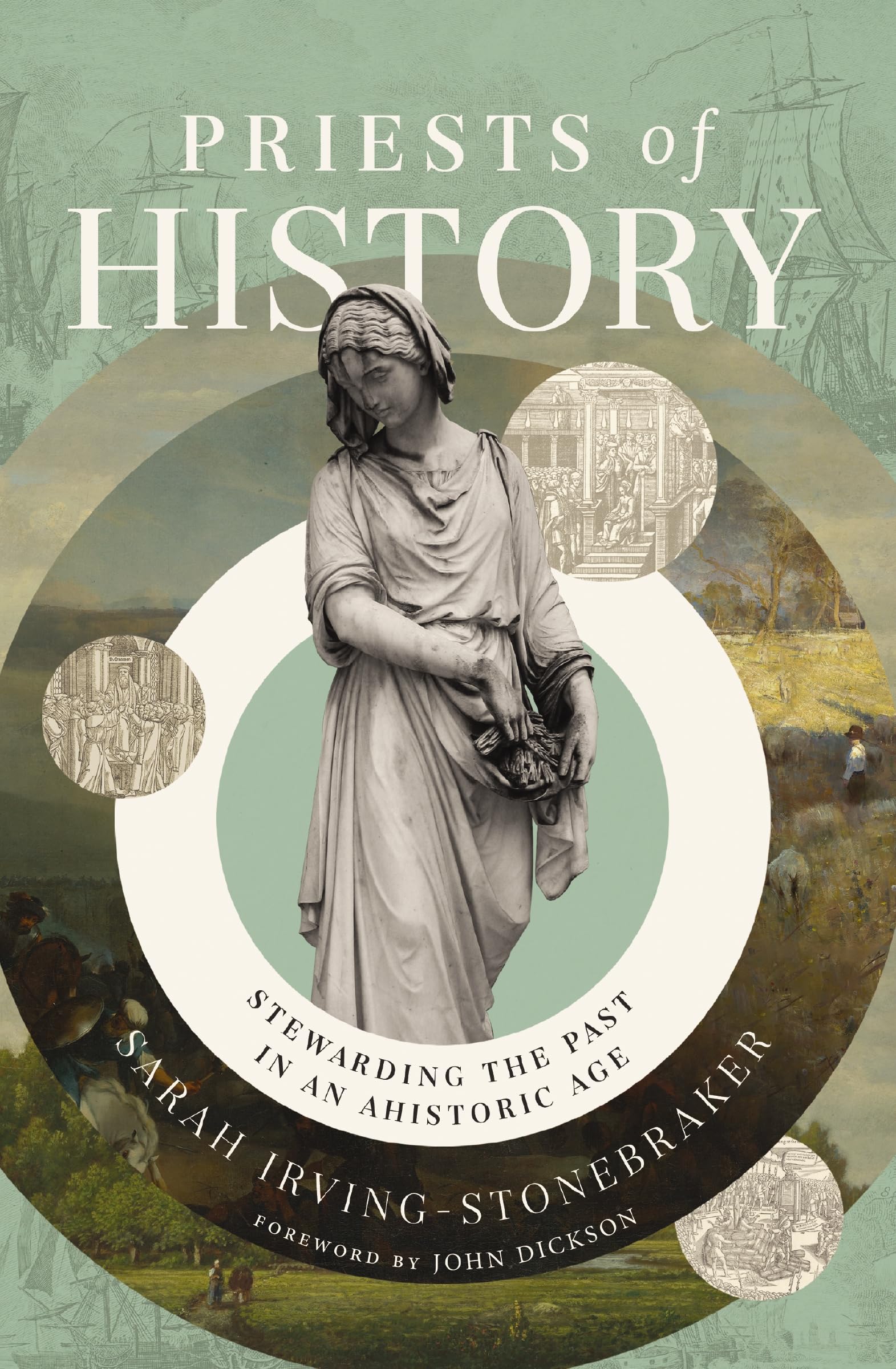Sarah Irving-Stonebraker’s Priests of History: Stewarding the Past in an Ahistoric Age will challenge your place in the world as a disciple of Jesus.
I recently picked up a children’s picture book featuring brave Christians throughout history. Thinking it would benefit my daughter best, I was humbled to also receive an education in it, upon realising many names in the book were unknown to me. My knowledge of Christian history seems to be on par with that of my infant child.
My cluelessness is, in part, what confirms Irving-Stonebraker’s thesis in Priests of History. She argues that Christians in the contemporary West are living in an ‘Ahistoric Age’, a period where we are increasingly ignorant of history, and are unable to engage meaningfully with it, especially with its ethical complexities, beyond knowing a few factoids at a superficial level. Knowledge of history is also now often wielded (often inaccurately) as a weapon to score political or ideological points.
In an age underpinned by the idea that life is about self-invention and fulfilment, contemporary Western culture holds that the past has little to teach us. We live in what this book terms the “Ahistoric Age,” in which we are profoundly disconnected from history.
In Priests of History, Sarah Irving-Stonebraker draws upon her expertise, and her experience as an atheist who has become a Christian, to examine what history is and why it matters. If Christians can learn how to be “priests of history,” tending and keeping our past, history can help us strengthen and revive our spiritual and intellectual formation and equip us to communicate the gospel in a confused and rootless world.
Irving-Stonebraker argues that history is filled with examples of godly courage, wisdom, beauty, tradition, and spiritual fervour that Christians have guarded, cultivated, and passed down from one generation to the next. Today’s Christians are at risk of breaking this streak, which will inevitably dull the ways we worship, disciple, and evangelise. In short, history contains ‘vast treasuries’ for godly living (p. 88). The question is, are we willing to listen?
History and Evangelism in a Symbiotic Relationship
Priests of History is divided into three parts: the first details how we lost our connection to history, both in society and in church. The second presents a compelling vision on why we need history. The third sets out how history can help us in our worship, evangelism, and discipleship.
Throughout, Irving-Stonebraker weaves in her own testimony of conversion from atheism to Christianity, particularly the role that studying the historicity of the Christian faith played in it. She also includes practical illustrations on how to apply Christian traditions into daily life and worship, including practices used throughout history by inspiring Christians, such as the slave abolitionist Frederick Douglass and Australia’s own indigenous rights activist William Cooper. These personal stories make Priests of History very accessible for history noobs such as myself.
An aspect of the book I am struck by is how history and evangelism are engaged in a symbiotic relationship: An increased proficiency in history will aid our evangelism, and vice versa. This is because our Christian faith is, after all, a historical faith rooted in a time, place, and person. Having a robust and accurate understanding of the historicity of Jesus’ life, death, and resurrection will help us persuade not-yet-Christians of the truth of the faith.
Simultaneously, the more we evangelise, the more likely we will be to draw upon examples in history for our instruction, which in turn enriches our understanding and knowledge of the past. Many big questions that our societies face today are not new, and Christians have been engaged in a long conversation about them since the birth of the faith: How should Christians promote human flourishing? What should the engagement be between the church and the state? How should we think about this current day’s obsession with the avoidance of pain and the maximisation of pleasure? We deprive ourselves of great wisdom if we try to address these questions without engaging with old books and thinkers. As Irving-Stonebraker puts it, quoting C.S. Lewis, ‘If you join at eleven o’clock a conversation which began at eight you will often not see the real bearing of what is said’ (p. 120).
A Positive Duty for all Christians?
I was first intrigued by the title of this book. Irving-Stonebraker constructs the etymology of the phrase ‘priests of history’ as such: Firstly, by introducing us to the work of a priest. A priestly task is one of ‘tending, guarding, stewarding, and spreading the wonderful light of God’s presence to the whole world’ (p. 95). For example, the fifteenth-century scientist Richard Boyle saw himself as a ‘priest of nature’. In studying science, he is tending to God’s good creation. He is studying and preserving knowledge of nature with the goal of finding God’s imprint in the material world and exulting his good creation. A priest of history applies this type of attitude and methodology to the work of keeping the past.
Irving-Stonebraker argues that all Christians have a responsibility to ‘be a witness to the past, cultivate it, and keep uncovering the stories and ideas that comprise the history of the world’. We do so by ‘tending the past…uncovering the historical stories of people sometimes overlooked…and keeping and watching over the past, [including] protecting and passing down historical knowledge and our heritage as Christians’ (p. 96, emphasis original). Her biblical basis for calling all Christians to this task is that all Christians today are declared a ‘royal priesthood’ in 1 Peter 2:9 (p. 95).
There are some examples of positive duties applying to all Christians, with the Great Commission being the clearest (Matt 28:18–20). I’m still mulling over whether tending to history falls into this category, as Irving-Stonebraker argues. In my view, it is perhaps more accurate to frame the task of uncovering and guarding history as being subservient to the over-arching call to Christian life and discipleship, and not merely as an end in and of itself. One practical implication of such framing is that it permits a wide range of engagement of history by Christians, depending on their levels of knowledge, ability, and interest.
Personally, I find that learning history is complicated and sometimes difficult to access, synthesise, and give meaning to. In my experience, the more I look, the more questions I have, and sometimes, the less I understand. Tending to, and understanding history is a daunting task, and how would I know if I have discharged this responsibility well? Framing this task as one that equips me for Christian maturity helps me keep my eye on the prize, that is, to focus my learning and uncovering on this goal (Col 1:28) and not get bogged down by what I do not, or cannot know, of times past.
A Compelling Invitation to Access the Treasures that are Ours
What I can agree with Irving-Stonebraker on is that all Christians would benefit from recovering or rediscovering historical aspects of our faith. Our faith and witness today will be greatly enriched by revisiting stories of old, both the good and evil wrought by our Christian forbearers. Particularly for Christians living in the West, where we are increasingly atomised, individualised, and lonely, accessing history is a tool we can use to formulate a collective sense of our identity, by placing ourselves in the stream of thought of historical communities that have gone before us.
For these reasons, Priests of History is instructive and much needed for our present day. If you find yourself ignorant of the past, and quick to jump to conclusions about stories you read in history, this book would be valuable for you. In it, you will find a compelling invitation to engage with our complex history, train yourself to see God’s hand throughout the ages, and find your place in His story.
Priests of History was shortlisted for the SparkLit Christian Book of the Year for 2025.
















